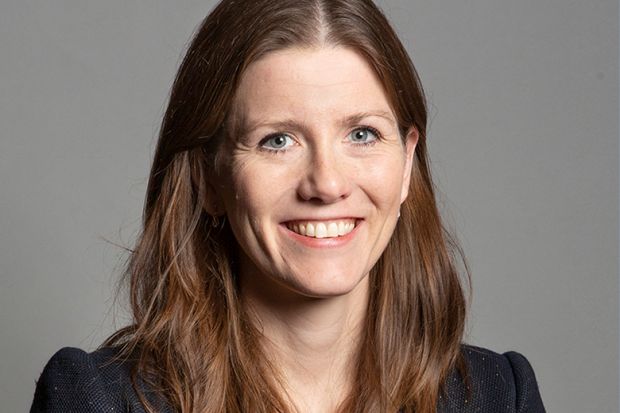The universities minister in the Westminster government has said it is “not useful to talk about targets or levels of numbers” when it comes to the question of whether the number of students entering English universities should be cut.
Michelle Donelan, who spoke to Times Higher Education after the government published Covid guidance aimed at ensuring students can safely return home for Christmas, also said the planned rapid and mass testing regime would come into play after the festive period when students return to campuses.
The government is expected to soon detail how it will achieve its planned rebalancing away from higher education towards further education in its long-awaited response to the Augar review of post-18 education. Education secretary Gavin Williamson has billed himself as “tearing up” former Labour prime minister Tony Blair’s target for 50 per cent of young people to enter higher education, while Ms Donelan has declared that “we don’t necessarily want everybody to go to university”.
Does she want to see the number of people going to university reduced from its present level?
“I don’t think it’s useful to talk about targets or levels of numbers,” Ms Donelan replied. “The reality is we need to be having a system that works for each individual…There are various [educational] routes that have equal value and it will depend on what that individual wants to do.
“In terms of our reforming agenda or where we’re going in this direction of travel, we’ve been very clear that we have a key agenda to lift up further education, to invest more in further education, to continue down the road of promoting apprenticeships…whilst also increasing the quality within higher education.”
Does rebalancing mean capping or restricting the number of students entering higher education, or incentivising alternative vocational routes to a greater extent?
“All of these things will be addressed in our response to Augar in the forthcoming months in line with the spending review,” Ms Donelan said. “Obviously, we’ve been considering that at great length and what’s in the best interests for students, prospective students and linking with our economy and the wider needs of our society.”
Asked whether legislation addressing free speech on campuses could be forthcoming, the minister said: “We’ve asked universities to prioritise this as an area and we’ve made clear that if it isn’t, we will have to look at legislative measures within the Parliament.”
The government’s guidance aimed at helping students return home safely at Christmas, published on 11 November, outlines rapid mass testing, self-isolation for students who test positive, a six-day travel window and a switch to online-only teaching by 9 December to allow all that to kick in.
The guidance was about the government delivering on its promise to get students home for Christmas and universities are “working with us to facilitate that”, Ms Donelan said.
Some in the sector are concerned that the guidance was published just three weeks before it comes into play – and fear that government guidance on the post-Christmas return to university may land similarly belatedly just as the festive holidays begin, reducing the scope to prepare.
Asked how she saw the post-Christmas return, Ms Donelan said: “We’re still going to be in the midst of a pandemic in January. But what won’t have changed is our commitment to education and to making sure these students don’t have to put their lives on hold…We will work with the Department of Health and Test and Trace to make sure we facilitate the safe return again of students…and we will utilise these rapid tests once again.”




